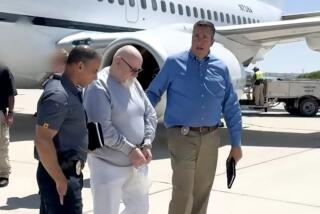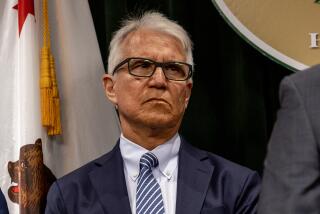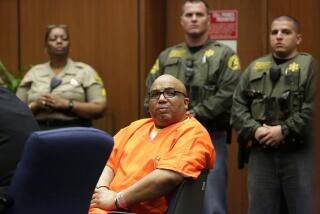DNA samples from slain women linked to suspected serial killer
- Share via
An analyst testified Tuesday that bodily fluids recovered from the bodies of 10 murdered women matched accused serial killer Chester Dewayne Turner’s DNA.
Turner, 40, is charged with strangling 10 women, one of them pregnant, in the 1980s and 1990s. Their partially naked bodies were mostly left in vacant buildings, alleys and stairwells in South L.A.’s Figueroa Street corridor.
Turner has denied killing anyone. If convicted, he could face a possible death penalty.
Jody Hrabal of Orchid Cellmark, a Texas-based private forensic lab that contracts with the city of Los Angeles, told a downtown Los Angeles courtroom that all of the women had at least one sample that matched Turner’s DNA. The fluids included semen and saliva, and were taken primarily from the women’s genital areas.
Hrabal conceded that unknown DNA also turned up in the women’s bodies, bolstering the defense contention that the genetic markers did not necessarily identify the killer. The defense has contended that the women were prostitutes who paid in trade for drugs from Turner, a narcotics dealer.
“The DNA that’s being presented shows that other people had contact with these women,” defense attorney John Tyre said outside court. “You can’t just say that because Chester Turner’s DNA is found that he committed murder, especially when you find other people’s DNA.”
But Deputy Dist. Atty. Truc Do said the finding of unidentified DNA did nothing to clear Turner.
“It’s not unusual to have unknown DNA -- many of the victims had engaged in prostitution and one was married,” Do said. “What is telling is that you have Turner’s DNA consistently showing up from victim to victim, over the span of 11 years.”
Hrabal’s testimony followed that of Carl Matthies, a former DNA analyst for the Los Angeles Police Department’s Scientific Investigation Division, who testified Monday that he also matched Turner’s DNA to the women’s samples. Hrabal and Matthies testified that they conducted their tests independently.
In court Tuesday, Turner wore a blue dress shirt and tan pants. He watched Hrabal’s testimony intently, gazing for several minutes at a large projection screen where each victim’s DNA results were posted. Turner’s last name, in red capital letters, was written next to samples that tested positive for his DNA.
The victims, in the order they died, were Diane Johnson, 21; Annette Ernest, 26; Anita Fishman, 31; Regina Washington, 27, and her unborn child; Andrea Tripplett; Desarae Jones, 29; Natalie Price, 31; Mildred Beasley, 45; Paula Vance, 38; and Brenda Bries, 37.
There were no witnesses to any of the crimes, but there was a surveillance videotape of the Vance killing. Prosecutors are expected to show the grainy black and white tape to the jury today.
The Turner case was used to promote Proposition 69, a 2004 initiative that called for a databank of DNA samples taken from people arrested in felonies.
*
More to Read
Sign up for Essential California
The most important California stories and recommendations in your inbox every morning.
You may occasionally receive promotional content from the Los Angeles Times.













